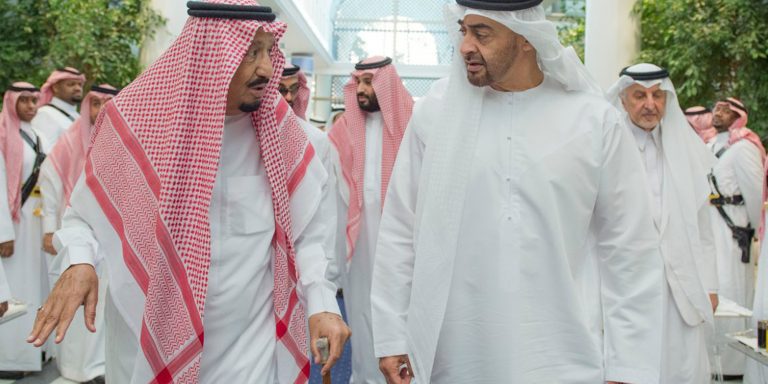INTELBRIEF
July 8, 2019
IntelBrief: Abu Dhabi Looks to Separate from Riyadh’s Disastrous Policies

- While the UAE is a close ally of Saudi Arabia, Abu Dhabi is now seeking to distance itself from Riyadh on critical issues of foreign policy.
- Following a string of tanker attacks believed to be perpetrated by Iran, the UAE cited a lack of evidence and declined to blame Tehran, breaking with both Washington and Riyadh.
- The UAE recently began withdrawing its troops and military hardware from Yemen, a disastrous war that has led to widespread humanitarian suffering and misery.
- Mohammed bin Zayed has recognized that the war in Yemen has become a rallying cry against Saudi intransigence; ending the conflict is one of the few issues able to garner bipartisan support in the U.S. Congress.
.
Even though the UAE is a close ally of Saudi Arabia, Abu Dhabi is now seeking to distance itself from Riyadh on key issues of foreign policy. First, following a string of tanker attacks believed to be perpetrated by Iran, the UAE cited a lack of evidence and declined to blame Tehran, breaking with both Washington and Riyadh. Next, in a far more high-profile decision, the UAE began withdrawing its troops and military hardware from Yemen. After four years, Abu Dhabi is cutting its losses in Yemen and seeking to extricate itself from the disastrous war. The conflict has been a political quagmire that has led to unimaginable civilian suffering and widespread disease and famine. Many tens of thousands of people have been killed in the war in Yemen, including untold numbers of children.
Under the leadership of Mohammed bin Salman (MBS), Saudi Arabia sought to convince the UAE that the conflict in Yemen would be a quick win. However, it has proven anything but, particularly as Iranian-backed Houthi rebels have taken the fight to the Saudis, launching a barrage of drone and missile attacks that have exposed the Kingdom’s suspect air defenses. The relationship between MBS and UAE’s ruler, Mohammed bin Zayed (MBZ), has always been based on shared interests, and it now appears that Yemen no longer qualifies. As the goals and aims of Abu Dhabi and Riyadh further diverge in crucial areas, expect the former to continue to exert its independence and avoid pitfalls like Yemen, choosing to remain neutral or break ranks rather than partner on wars of choice that have become lost causes. Following the brutal murder of Jamal Khashoggi, an act with links directly to MBS, many longstanding Saudi allies have reconsidered the wisdom of forging an alliance with such a reckless country.
The withdrawal of Emirati forces from Yemen is important both symbolically and practically. By choosing to publicly distance himself from the Saudi-led campaign, MBZ is making it known that he is aware of how the international community perceives this conflict. Moreover, losing Emirati support will hurt the Saudi effort, as Abu Dhabi had contributed to the air campaign, supplied ground troops, and offered critical intelligence gathering capabilities. Initially, the UAE had tangible goals in Yemen, including securing control of important ports that would provide a geopolitical advantage, but as the war drags on, it has become clear that both sides have reached a military stalemate.
MBZ has recognized that the war in Yemen has become a rallying cry against Saudi intransigence. For bin Zayed, the disastrous war in Yemen has become a political liability that he can no longer ignore. Yemen is connected to MBS and Saudi Arabia, and although MBS has been unable or unwilling to extricate his country from the ongoing quagmire, MBZ has no such qualms—he has recognized that Yemen is a humanitarian disaster that is now a line in the sand for American politicians. Indeed, the war in Yemen is one of the few issues able to garner support across Democrats and Republicans in the U.S. Congress, a rare event in the hyper-partisan environment that has characterized politics in Washington for the past several years. In April, Congress voted to severely limit American military support for the war, although U.S. President Trump vetoed this measure. Members of both parties in Congress are currently working to restrict arms sales to the Saudis and Emiratis, perhaps one of the reasons for MBZ’s decision to reduce his country’s role in what is widely recognized as a humanitarian nightmare.
.
For tailored research and analysis, please contact: info@thesoufancenter.org
[video width="960" height="540" mp4="https://thesoufancenter.org/wp-content/uploads/2019/07/IB-0708.mp4" poster="https://thesoufancenter.org/wp-content/uploads/2019/07/AP_17156217113926.jpg"][/video]